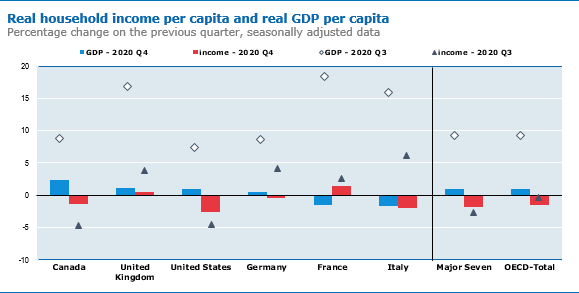OECD launches COVID travel blueprint
31/05/2021 – OECD Ministers have endorsed a new initiative to promote safe international travel during the COVID-19 pandemic at the OECD’s annual Ministerial meeting in Paris.
The Initiative involves a safe travel blueprint and a temporary international cross-sectoral forum for knowledge sharing. The forum will allow governments and stakeholders to share information in real time on plans and approaches facilitating travel. The blueprint promotes greater certainty, safety and security in travel as reopening takes place. It builds on existing initiatives and aims to increase interoperability amongst travel regimes. It will be used by countries on a voluntary basis.
International air passenger transport dropped around 75% in 2020 and international tourism fell by around 80%. For the average OECD country, pre-pandemic, international tourism contributed 4.4% of GDP, 6.9% of employment, and 21.5% of service exports, but with much higher shares for some countries, including Greece, Iceland, Mexico, Portugal and Spain. The halt in international travel and tourism is having a dramatic knock-on impact on the entire, interlinked global economy.
“The OECD is in a unique position to help countries coordinate international action in the context of reopening global travel,” said OECD Secretary-General Angel Gurría at the Ministerial meeting in Paris. “This initiative will help reduce uncertainty and complexity and enable countries to prepare more effectively for a return to safe international travel and tourism.”
Without an international framework for travel policies, a patchwork of national and regional rules, inconsistent with each other, will continue to be confusing and costly for travellers and transport and tourism companies, discouraging travel due to the uncertainty and complexity. It could also increase the incidence of use of fraudulent certificates and so undermine the ability of authorities to mitigate public health risks.
The OECD Blueprint, initiated by Spain, supports and complements existing international initiatives, such as the European Union’s proposed ‘Digital COVID-19 Certificate’, by taking a principles-based approach to ensuring that they are compatible with each other, and adopted in a consistent way across a range of countries.
The Blueprint is a flexible and voluntary set of guidelines not a legal text. It consists of a traffic-light system to classify risks; guidance on how vaccination should be certified for travel to those countries that decide to take vaccination status into account; protocols for testing travellers in different circumstances; and principles to be followed in generating electronic certificates for travel that ensure privacy protection and security and promote interoperability among systems.
Countries that use the OECD Blueprint may do so unilaterally or in bilateral or multilateral agreements, or through mechanisms provided in other bodies, such as, in particular the ICAO Public Health Corridor arrangement.
Read the document and the Q&A for more information.
For more information, journalists should contact the OECD Media Office (tel. + 33 1 45 24 97 00).
Working with over 100 countries, the OECD is a global policy forum that promotes policies to improve the economic and social well-being of people around the world.

